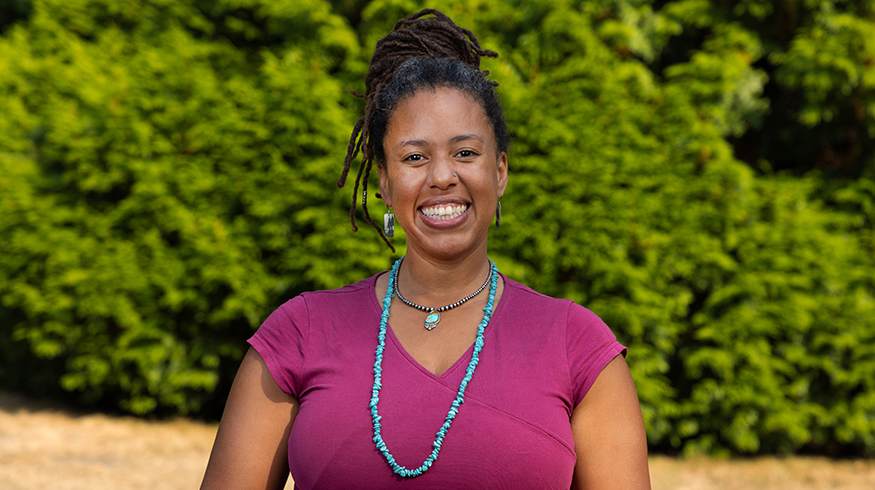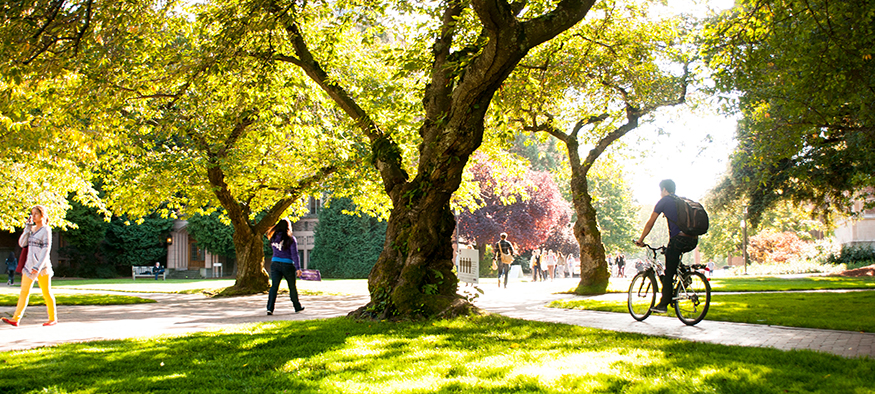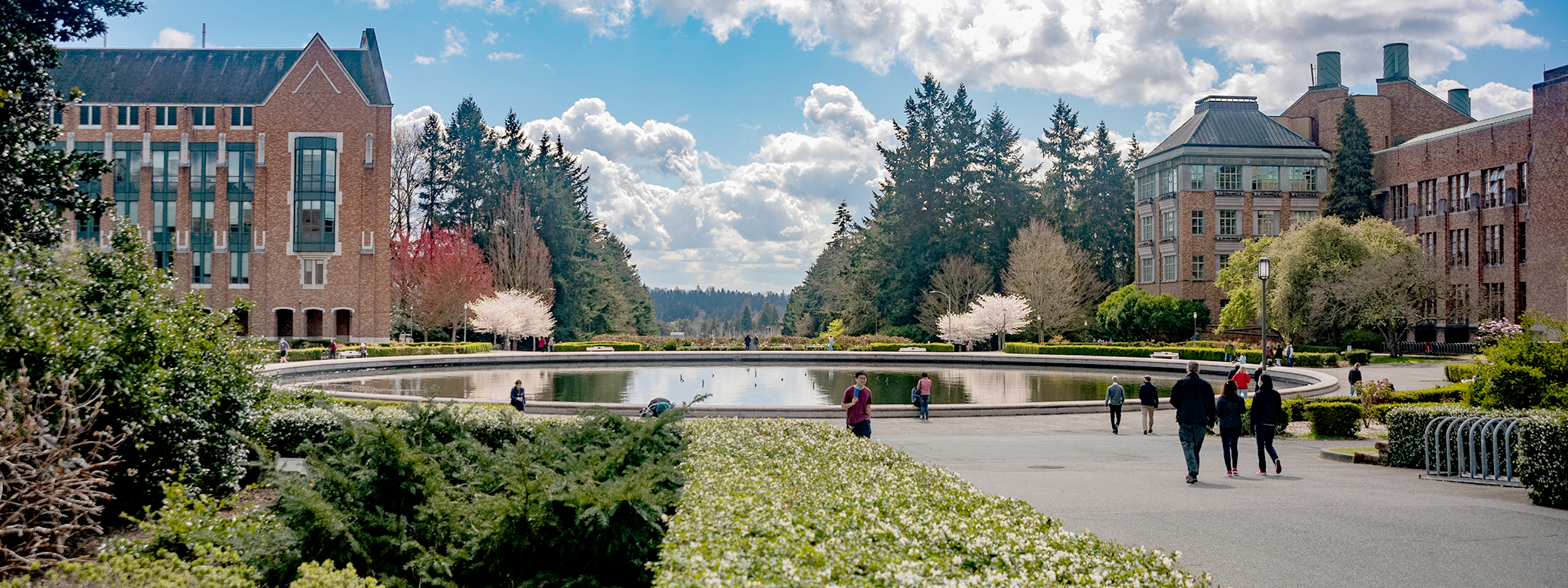
In September 2022, Maya Angela Smith, associate professor of French & Italian Studies, joined the leadership of the UW College of Arts & Sciences as associate dean for equity, justice and inclusion [ADEJI]. Arts & Sciences Dean Dianne Harris created the new leadership position, recognizing the need for a more dedicated focus on diversity, equity, and inclusion in the College, with an emphasis on faculty efforts in this area.
“In the College of Arts and Sciences, one of our ongoing and prioritized commitments is to imagine and create the most equitable, just, and inclusive faculty culture of any peer institution,” says Harris. “Maya Smith is exactly the right person to lead this work. With her deep expertise that crosses domains, she will help us attain our goal of modeling the very best practices and creating within the College an image of the world as we wish it to be and as we know it can be. I’m thrilled to welcome her as our inaugural associate dean for equity, justice, and inclusion and look forward to collaborating with her in the years ahead.”
Smith is a sociolinguist whose scholarship broadly focuses on the intersection of racial and linguistic identity formations among marginalized groups in the Francophone African diaspora. Her first book was a qualitative study showcasing the experiences and reflections of Senegalese in Paris, Rome, and New York City. She also has written extensively about multilingualism as well as equity issues in language programs.
Here Smith answers questions about her new role.
Why were you interested in this position?
Both my research interests and my lived experiences contributed to my decision to apply. Equity, justice, and inclusion are central to my entire research agenda. I also know what it’s like to be a Black faculty member in a very white field, institution, and city. I will use that experience, as well as listening to the unique experiences of others, to tackle some of the greatest challenges.
How would you describe your new role?
My role is to figure out ways for faculty, particularly those with the least access to resources, to thrive at the UW. This is a big ask because the College is very large, with each of its departments and centers needing different interventions for creating a more equitable, just, and inclusive environment.
With so many possibilities in how to approach this new position, where will you start?
I want to understand where we are at as a College with DEIJA (Diversity, Equity, Inclusion, Justice and Access) and then figure out how my office can best support units and individuals. My first initiative will be to create a centralized repository of DEIJA-focused materials gathered from within the College, the University, and other higher learning institutions. This will include examples of hiring plans and rubrics, syllabi and sample lesson plans, prompts to help guide departments in having crucial conversations around DEIJA, funding opportunities for DEIJA-centered activities, etc. While this effort will make important materials accessible, it will also give me a sense of departments’ DEJIA efforts up until now. I then want to conduct an honest equity assessment of how we are doing with dismantling structural inequities around hiring underrepresented faculty and in creating a space where faculty members who are already here want to stay and have the resources and support they need to succeed.

How will you approach that equity assessment?
I plan to speak with divisional deans, chairs, and departmental DEI committees, as well as with junior faculty, teaching faculty, staff, and others who may be doing a lot of the difficult groundwork to make changes in their units. I also want to collaborate with DEIJA offices across campus to see how I can complement ongoing work. There are many great grassroots initiatives that have cropped up to address pressing issues that I want to amplify.
How do you think your own experiences at the UW will inform your approach?
I have learned to navigate the institution pretty well by knowing who to ask for what. I have cobbled together resources that have allowed me to succeed in my research and teaching. But it shouldn’t be so difficult to figure this out, and access shouldn’t rely on luck and connections. All faculty should have the necessary resources to do their job well. I want to create infrastructure where those wanting to do work in equity, justice, and inclusion can do so. And people who don’t have access to what they need know where to go for support. We need to better share the wealth of knowledge that already exists on this campus as well as create new initiatives to address what’s missing.
My role is to figure out ways for faculty, particularly those with the least access to resources, to thrive at the UW.
Since being appointed to this new role, have colleagues contacted you with concerns or suggestions, and have there been common themes?
A major concern is burnout from increased workloads during the pandemic. Practically every faculty member has experienced feelings of being overwhelmed. However, the people who are reaching out to me are the ones who are doing even more labor. Often minoritized and first-generation faculty are taking on a larger portion of the burden.
In what ways?
As we recruit more students from non-traditional backgrounds, those students seek out faculty with similar experiences to help them navigate an environment that’s not always very accessible. It's so important for minoritized or first-generation students to see that someone like them can make it through and succeed. Likewise, students of all backgrounds often reach out to faculty who signal awareness of mental health or equity issues. Supporting these students often comes in the form of emotional labor, and it’s something that goes unseen. The number of students that I've had in office hours crying because of this or that — I appreciate that they feel that they can open up in that space, but it takes a huge toll on top of my other work. It just compounds. It's important to ensure that those who do this work are properly recognized and that service burdens are equitable.
Yet with so much on your plate, you still chose to take on this new administrative role.
When the application for the position was due, I was teaching a new course, working on numerous research projects, and without childcare for four weeks. From a personal perspective, I wasn’t sure I had the bandwidth at that moment to apply. But I knew that I have a lot to offer the position, and I am deeply passionate about equity issues. I figured that taking on this role was one way to make a positive change at UW, and I am looking forward to collaborating with the UW community to achieve this goal.
More Stories

What Students Really Think about AI
Arts & Sciences weigh in on their own use of AI and what they see as the benefits and drawbacks of AI use in undergraduate education more broadly.

AI in the Classroom? For Faculty, It's Complicated
Three College of Arts & Sciences professors discuss the impact of AI on their teaching and on student learning. The consensus? It’s complicated.

A Love of Classics and Ballroom
Michael Seguin studied Classics at the UW and now owns Baltimore's Mobtown Ballroom. The two interests, he says, are more connected than they might seem.
